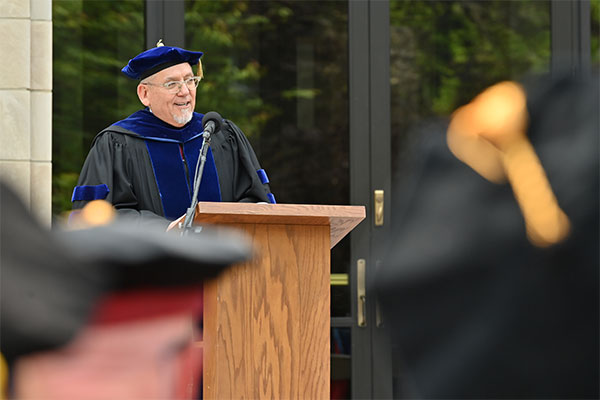These were some of the words of encouragement and inspiration that Fordham President Tania Tetlow shared with the Graduate School of Education (GSE) Class of 2023 on Monday, May 22.
At the diploma ceremony, held in front of the Walsh Family Library on the University’s Rose Hill campus, Fordham bestowed master’s and doctoral degrees upon students across GSE’s programs, from newly minted classroom teachers and school psychologists to educational leaders and administrators looking to advance in their careers.
Accelerated Teaching Program Leads to ‘Amazing’ Job
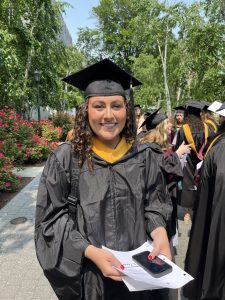
For Margaret Costikyan, the day capped a five-year journey that began in 2018, when she enrolled at Fordham College at Rose Hill as an undergraduate. She knew she wanted to become a classroom teacher—and she knew Fordham’s accelerated five-year Master of Science in Teaching program would get her there faster.
Now, having earned an M.S.T. one year after receiving a B.S. in psychology and sociology, she’ll be teaching full time at the Bronx public school where she did her student teaching.
“The school where I was placed, PS 71—the community there is amazing,” Costikyan said. “I’ve met so many teachers who want to support me as a first-year teacher, so I’m really excited and thankful to Fordham for that.”
A Focus on the Socioemotional Needs of Children
Fordham GSE’s partnership with the New York City Department of Education was a draw for Samantha McCusker, who received a master’s degree in school psychology.
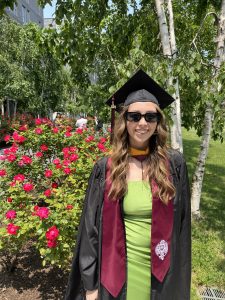
“Being able to use that as a connection to network was a big point,” McCusker said, adding that when she initially met with professors at GSE, “it just felt like home to me.” Since 2021, her second year in the program, she’s been working as a school psychologist in Harlem, and she takes pride in being able to serve her students.
“Learning from the kids that I’m around and how they live, and seeing how I can best support them, is probably the most impactful part of my job,” she said.
The socioemotional needs of students have been front of mind for most educators, especially as schools have tried to catch up from the disruptions caused by the COVID-19 pandemic, remote learning, and all the associated stressors.
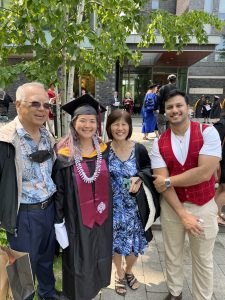
Shannon Urabe, who completed the online M.S.T. program, began teaching sixth and seventh graders at the Windward School on Manhattan’s Upper East Side during her time in the program. She has felt increasingly optimistic as she’s watched her students readjust to in-person learning.
“Seeing how the kids have swung back around from COVID and seeing how they’re re-learning how to engage with one another has been good to see. They’re embracing connecting with one another,” said Urabe, whose parents came from Hawaii to watch her graduate.
Finding Community—and Benefiting from Program Flexibility
Urabe said the flexibility of the online program was a big factor in her grad school experience. “It was an easy transition [beginning the program in August 2020, during COVID],” she said, “because they were already prepared for this type of learning,”
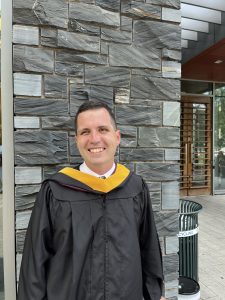
The flexible nature of GSE’s programs was also a draw for Joseph Dujmovic, a Queens native who earned a Master of Science degree in the Educational Leadership, Administration, and Policy division. Over his two years in the program, which included courses in person and online, he was able to keep up with classes while spending summers in Croatia and working as division head of the upper school at the Academy of St. Joseph in Greenwich Village.
Dujmovic said he appreciated receiving one of the faith-based scholarships Fordham offers to employees of Catholic schools, and he built close relationships with faculty. A particular highlight, he said, was a class with adjunct professor Anthony Miserandino, Ph.D., GSE ’77, ’84, on implementing change at an institutional level. “It was incredible, and he’s been a great mentor ever since.”
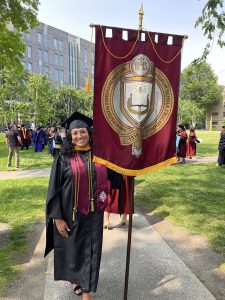
For Maria Cimina, who began the master’s program in mental health counseling fully online in 2021 but transitioned to in-person classes over her two years, building close relationships with her cohort was central to her experience. She became one of the leaders of the Student Association for Mental Health Counseling, a network for both students and alumni of the program, with Professor Eric Chen, Ph.D., calling her “a star of our mental health counseling student leadership team.”
“Finding a space in the community was really important for me,” Cimina said. “We had such a strong cohort, and it was really important to reinvest in the people and the work that we were doing, and really drive home how important it was to be present on campus.
“There’s a beautiful sense of community. If you’re willing to take advantage of that, the program itself will expand in value tenfold.”
